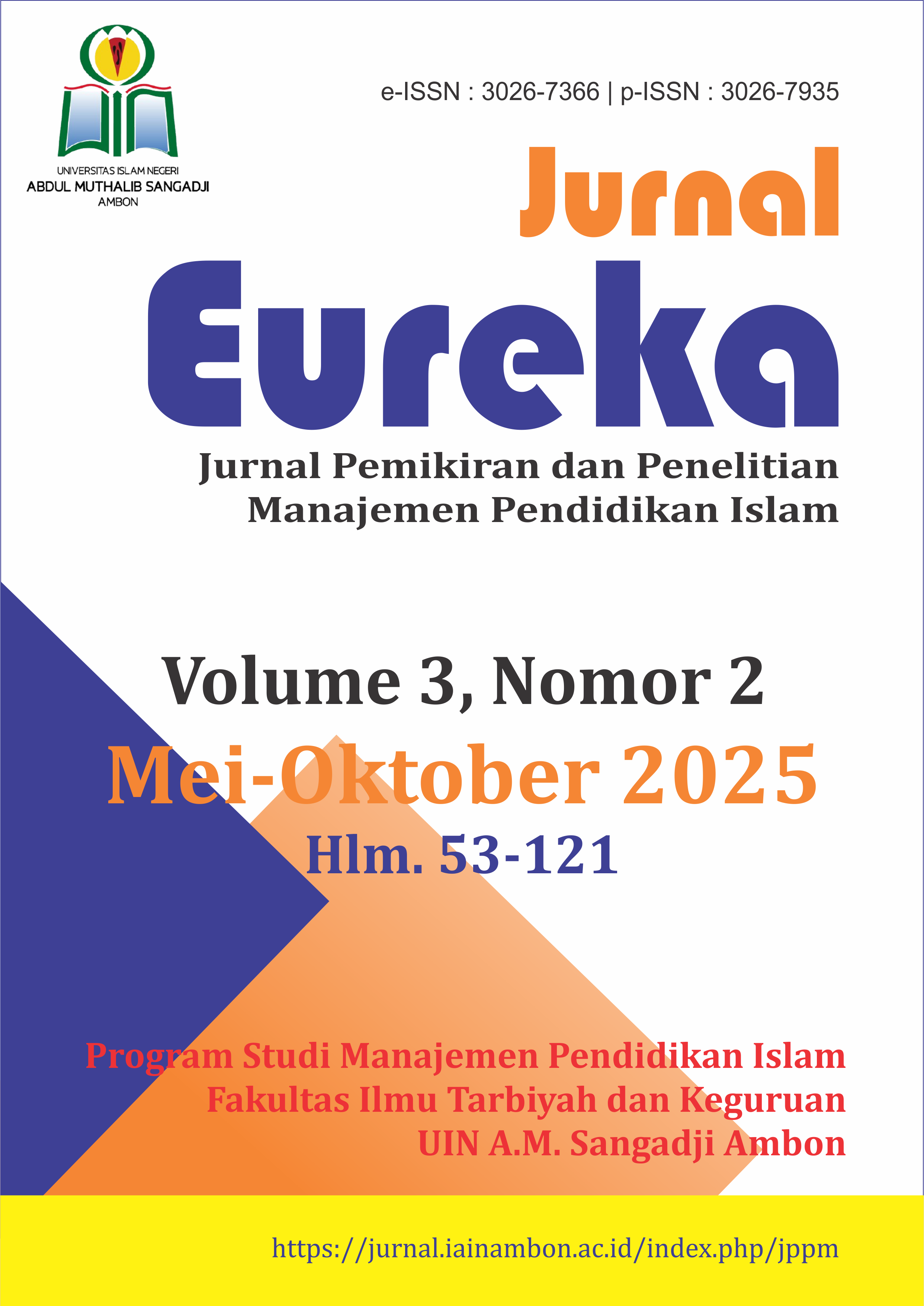Manajemen Pendidikan Berbasis Nilai Tawadhu dan Disiplin di MTsN 6 Kerinci
DOI:
https://doi.org/10.33477/eureka.v3i2.11806Abstract
Abstrak. MTsN 6 Kerinci merupakan salah satu madrasah yang berada di pinggiran kota dengan keterbatasan sarana dan prasarana, namun mampu menunjukkan daya saing dan prestasi yang tidak kalah dibanding madrasah lain yang lebih favorit dan berada di pusat kota. Fenomena ini menunjukkan adanya kekuatan nilai yang mendasari manajemen pendidikan di madrasah tersebut. Penelitian ini bertujuan untuk mendeskripsikan penerapan nilai tawadhu (rendah hati) dan disiplin dalam manajemen pendidikan di MTsN 6 Kerinci, serta menganalisis implikasinya terhadap pembentukan karakter dan pencapaian prestasi peserta didik. Metode yang digunakan adalah pendekatan kualitatif dengan analisis pemikiran (thought analysis), melalui kajian literatur, observasi lapangan, dan wawancara dengan pihak terkait. Hasil penelitian menunjukkan bahwa nilai tawadhu menjadi landasan etika kepemimpinan dan interaksi sosial di lingkungan madrasah, sedangkan nilai disiplin menjadi pilar pengelolaan kegiatan belajar mengajar dan tata tertib sekolah. Penerapan kedua nilai tersebut tidak hanya berkontribusi pada terciptanya iklim belajar yang kondusif, tetapi juga membentuk karakter siswa yang santun, tekun, dan berprestasi baik di tingkat kabupaten maupun kota. Simpulan penelitian ini menegaskan bahwa manajemen pendidikan berbasis nilai tawadhu dan disiplin merupakan strategi efektif dalam mengelola lembaga pendidikan dengan keterbatasan sarana prasarana. Implikasi dari penelitian ini adalah pentingnya integrasi nilai-nilai Islami dalam praktik manajemen pendidikan untuk mewujudkan madrasah yang unggul dan berkarakter.
Kata Kunci: disiplin, manajemen pendidikan, MTsN 6 Kerinci, tawadhu
Abstract. MTsN 6 Kerinci is a madrasa located on the outskirts of the city with limited facilities and infrastructure, but is able to demonstrate competitiveness and achievements that are not inferior to other, more popular madrasas located in the city center. This phenomenon indicates the strength of values underlying educational management in the madrasa. This study aims to describe the application of the values of tawadhu (humility) and discipline in educational management at MTsN 6 Kerinci, and analyze their implementation on character formation and student achievement. The method used is a qualitative approach with thought analysis (thought analysis), through literature studies, field observations, and interviews with related parties. The results of the study indicate that the value of tawadhu is the foundation of ethics, leadership and social interaction in the madrasa environment, while the value of discipline is a pillar of the management of teaching and learning activities and school rules. The application of these two values not only contributes to the creation of a conducive learning climate, but also forms the character of students who are polite, diligent, and achievers both at the district and city levels. The conclusion of this study confirms that educational management based on the values of tawadhu and discipline is an effective strategy in managing educational institutions with limited facilities and infrastructure. The implication of this research is the importance of integrating Islamic values into educational management practices to create superior and character-based madrasas.
Keywords: discipline, educational management, MTsN 6 Kerinci, tawadhu
Downloads
Published
How to Cite
Issue
Section
License
Authors who publish with this journal agree to the following terms:
Authors retain copyright and grant the journal right of first publication with the work simultaneously licensed under a Creative Commons Attribution License that allows others to share the work with an acknowledgment of the work's authorship and initial publication in this journal. Authors are able to enter into separate, additional contractual arrangements for the non-exclusive distribution of the journal's published version of the work (eg, post it to an institutional repository or publish it in a book), with an acknowledgment of its initial publication in this journal. Authors are permitted and encouraged to post their work online (eg, in institutional repositories or on their website) prior to and during the submission process, as it can lead to productive exchanges, as well as earlier and greater citations of published work (See The Effects of Open Access).






